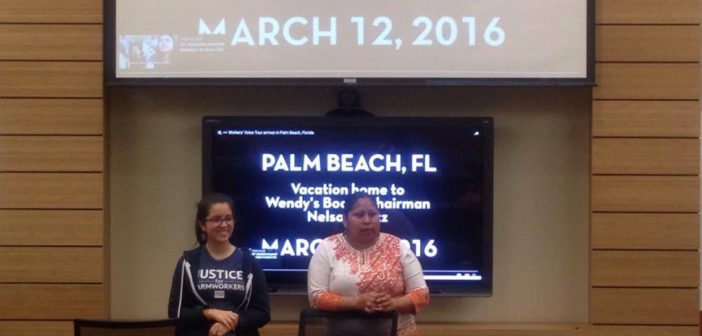[tribulant_slideshow gallery_id=”36″]
With the very advanced and mechanized world that currently exists, it is easy to overlook the effort required to keep it functioning smoothly. Therefore, organizations like the Coalition of Immokalee Workers (CIW) set out to raise awareness of and to minimize the struggles faced by farm workers, an important but undermined group in our society. As a part of their current outreach, the CIW visited the University on Mar. 1 to present on the Immokalee tomato pickers and the Fair Food Program.
The CIW represents tomato pickers in Immokalee, a farm nearby Ft. Myers. This organization was formed out of the need for better working conditions and pay for the workers. Before now, workers were paid a small wage based on the number of buckets they filled with tomatoes. This became more difficult and negatively affected their livelihoods during the off-season when the tomato plants were no longer laden with fruit. This, coupled with long hours, use of carcinogenic fertilizers, the cruelty of crew leaders, and sexual harassment, proved to be a story of modern-day slavery.
This sparked the workers to bargain with the growers who were responsible for the farms. They asked for increased wages and better conditions but were met with rejection as the growers claimed to be doing the best that they could with the challenges they faced from the buyers. As such, the CIW targeted the buyers next with the first being Taco Bell, which was a huge buyer of Florida tomatoes. However, even higher in the hierarchy was consumers, and they are the new target. In 2001, a new consumer-powered Campaign for Fair Food was launched with the aim of educating consumers on the labor conditions behind the food they eat.
Through the campaign, farm workers have rallied consumers to encourage retail food companies to use their purchasing power to enforce higher labor standards for farm workers. Over the next decade this newfound alliance got a dozen companies, including Walmart and Burger King, to sign the Fair Food Agreement. In 2015, the Program even expanded beyond Florida tomato pickers to include seven states and three crops. The agreement asks corporations to pay a small premium, which is given to the workers as a bonus. They also ask that companies only purchase from growers who adhere to the Fair Food Code of Conduct. Under the code, growers must ensure that there is:
- Zero tolerance for forced labor
- No verbal or physical abuse, or sexual harassment
- Safe working conditions
- Shade, clean restrooms, and drinking water
- The right to report abuse without fear of retaliation
- A fair wage
The event was well received by all who attended. Students were especially intrigued by the activity that demonstrated what it is like to carry 32 lb. bushel baskets of tomatoes all day long from the fields to the trucks.
Derek McIntosh, a sophomore accounting major, said, “This was a very interesting presentation that really opened my eyes to how disconnected consumers are from how the food we eat is acquired. This is an amazing cause that garners my support!”
Despite this progress, the struggle continues with companies like Wendy’s which refuse to join on. The Return to Human Rights Tour is a new and initiative way to target this problem, and the CIW encourages all to join their boycott of Wendy’s. More information is available on their website.





